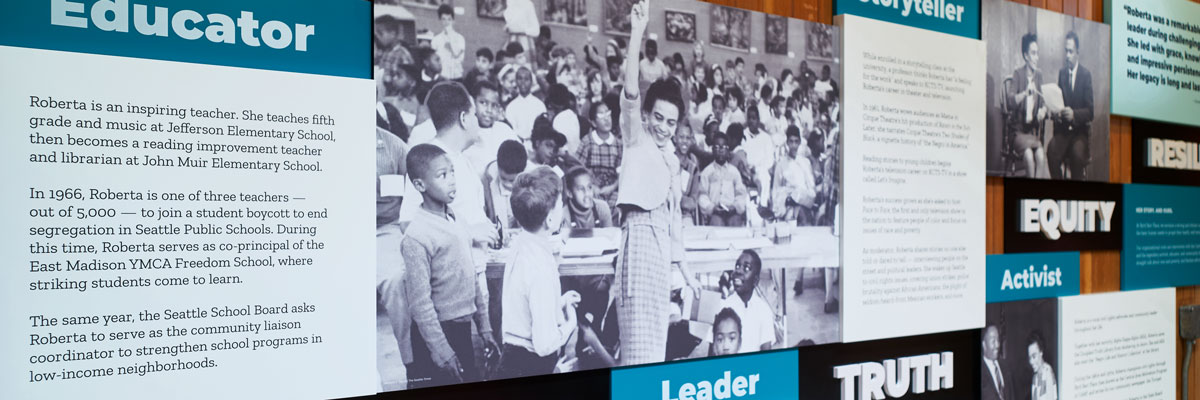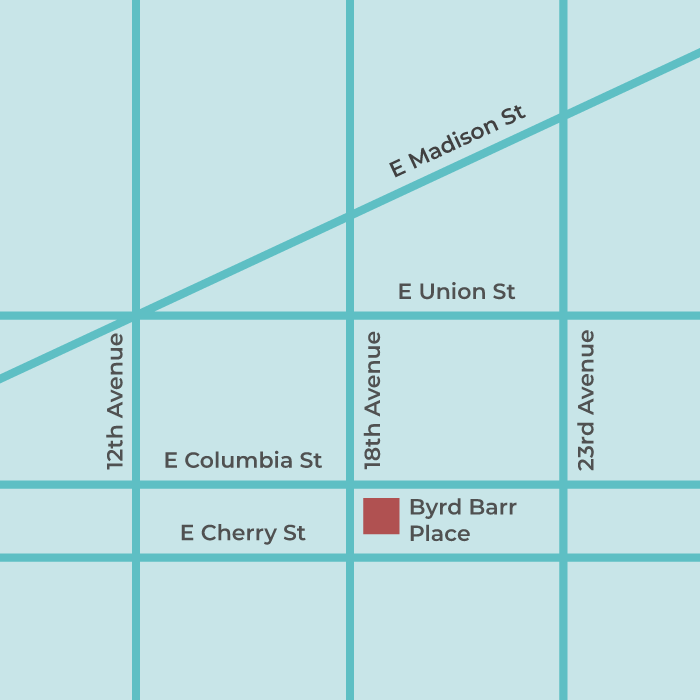A Story of Resilience
First known as the Central Area Motivation Program (CAMP), our original purpose endures to this day: helping people move from poverty to self-sufficiency in Seattle and building the political strength and economic wealth of the Black community statewide.
Byrd Barr Place Timeline
| 2024 | Byrd Barr Place celebrates 60 years of social service, community empowerment and advocacy toward building an equitable future for all Washingtonians. |
| 2023 | After 20 years of leadership at Byrd Barr Place, Andrea Caupain Sanderson passes the torch. Throughout her tenure, she has an enormous and enduring impact on Byrd Barr Place, including securing ownership and raising $12.8 million to renovate the firehouse as the organization’s long-term home, fortifying essential services for people struggling to make ends meet, and mobilizing significant advocacy on behalf of the Black community. In July, Dr. Angela Griffin becomes the next CEO to expand on the organization’s rich legacy of social service and racial justice work. |
| 2021 | Responding to the substantial need from the health and economic impacts of the COVID-19 pandemic, Byrd Barr Place disseminates emergency rental assistance, makes grants to Black businesses, expands home grocery delivery and more. |
| 2020 | The organization produces two more vital research reports that undergird advocacy: And So We Press On: A Community View on African American Health in Washington State and The Case for Investing in Black-led Organizations in King County. |
| 2019 | Byrd Barr Place supports the redevelopment of the Liberty Bank Building in partnership with Africatown Community Land trust, Black Community Impact Alliance and Capitol Hill Housing to help preserve affordability in the Central District neighborhood by bringing 115 units of much-needed affordable housing and retail space for Black and other people of color businesses. |
| 2018 | Centerstone becomes Byrd Barr Place, honoring civil rights leader, educator, CAMP supporter and journalist Roberta Byrd Barr, and reaffirming the organization’s commitment to the Black community. |
| 2015 – 2017 | The organization focuses on research and advocacy, producing two critical reports: Creating an Equitable Future in Washington State: Black Well-Being & Beyond and Voices Rising: African American Economic Security in King County to support collective organizing, inform policy and direct resources toward Black-led solutions. |
| 2014 | The organization celebrates our 50th anniversary of fighting poverty and creating opportunity for people throughout Seattle. |
| 2012 | CAMP changes its name to Centerstone, demonstrating the myriad of ways the organization supports all people in accessing basic human needs through programs and services. |
| 2009 – 2011 | The organization initiates a plan to broaden CAMP’s mission, strengthen funding and offer important new programs to the Central District and beyond. |
| 1990 – 2008 | CAMP’s programs expand to address the growing problem of gang violence related to the spread of drug trafficking. Still committed to fighting poverty, CAMP develops programs to support people struggling with homelessness and promote economic development. |
| 1980 – 1990 | CAMP continues to respond to community priorities, setting up an information and referral service, expanding self-sufficiency programs like energy assistance, and investing in community organizing to address systemic challenges, such as housing and employment. |
| 1979 | CAMP joins the Washington State Community Action Program, a statewide organization of 30 agencies working in all 39 counties to provide vital human services to individuals and families with low incomes. |
| 1974 – 1978 | CAMP opens an annex and extends its services into Southeast Seattle to respond to the shift in the African American population from the Central District to the Rainier Valley. |
| 1971 – 1973 | The federal government designates the Model City Program and Concentrated Employment Program (CEP) as the primary vehicles for combating inner-city poverty. CAMP is situated across the street from the Seattle Model City Program, and the two programs partner to lead urban renewal initiatives. |
| 1966 – 1970 | CAMP flourishes during the civil rights movement. The organization grows to over 300 employees in the summer of 1967, with hundreds of volunteers. CAMP launches over 25 pioneering community service initiatives, including an array of employment and training programs for people experiencing poverty. |
| 1965 | The first three CAMP staff members are hired. |
| 1964 | Central Area Motivation Program (CAMP) is founded to help people help themselves, as part of the first generation of community-inspired organizations funded by the U.S. Economic Opportunity Act. |
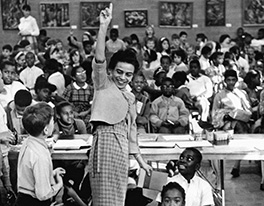
Roberta Byrd Barr
In 2018, our organization became Byrd Barr Place, named in honor of legendary Seattle civil rights leader Roberta Byrd Barr.
Ms. Roberta was a community leader, an educator and a journalist. She was a powerful advocate, standing up for what is right and elevating the voices of the Black community and the poor.
When Seattle teachers boycotted and demanded desegregation in 1966, Ms. Roberta was in the ranks and headed a Freedom School — a temporary, free school for African Americans — at the YMCA. In 1973, she became principal of Lincoln High School — both the first woman and the first African American — to hold such a position in Seattle Public Schools.
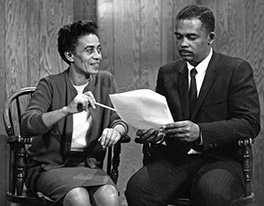
Honoring a Legacy
Ms. Roberta was a well-known and engaged member of the community. From 1965 to 1972, she moderated the weekly television program Face to Face, which featured provocative discussions on topics including race, desegregation, education and welfare. She also wrote for CAMP’s monthly newsletter, Trumpet, which kept the community up to date about issues and programs of importance to them.
We share Ms. Roberta’s commitment to community, fairness and opportunity. As Byrd Barr Place, we seek to honor her legacy by continuing to challenge intolerance and injustice as we work to build an equitable future for all.
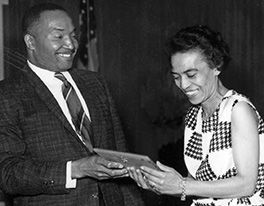
Photos courtesy of University of Washington Libraries, Special Collections, SOC18088
